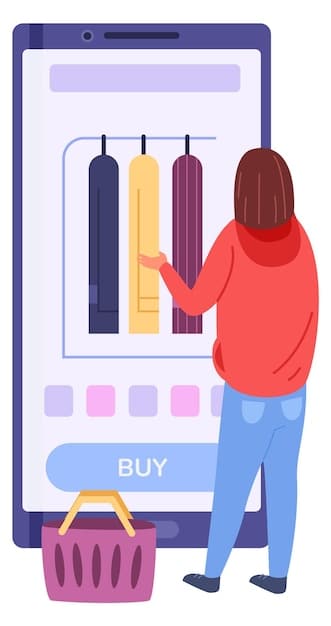Mastering Price Matching: Get the Lowest Prices at US Stores

Mastering price matching involves leveraging comparison tools and strategies to secure the lowest possible prices on products at various US stores, ultimately maximizing savings for consumers.
Are you tired of overpaying? Mastering price matching: using comparison tools to get the lowest price at US stores can unlock significant savings. Discover how to confidently navigate price matching policies and comparison tools to secure the best deals available.
Understanding Price Matching: A Smart Shopper’s Secret
Price matching is a retailer’s promise to match a competitor’s price on the same item. It’s a fantastic way to ensure you’re getting the best deal without having to shop around at multiple stores. But how do you effectively leverage this policy to your advantage?
The Basics of Price Matching
Price matching typically requires you to present proof of the lower price, such as an advertisement or a website link. However, each store has its own specific rules, so understanding those rules is key.
Benefits of Mastering Price Matching
The benefits extend beyond just saving money. Price matching saves time and effort, allowing you to purchase everything you need from a single store while still getting the best prices.
- Save money on purchases.
- Reduce time spent comparison shopping.
- Build confidence in your shopping decisions.
By understanding the ins and outs of price matching, you can shop smarter and keep more money in your pocket.

Top Price Comparison Tools for US Stores
Finding the lowest price manually can be time-consuming. Thankfully, numerous price comparison tools are available to streamline the process, gathering prices from various retailers in one place.
Website and Apps for Price Comparison
Several websites and apps specialize in aggregating prices from different stores. These platforms make it easy to quickly identify where a product is selling for the lowest price.
How to Use Price Comparison Tools Effectively
When using these tools, be sure to filter by your preferred stores and consider shipping costs, as they can significantly impact the final price.
- Compare prices across major retailers like Amazon, Walmart, and Target.
- Set up price alerts to track price drops on desired items.
- Utilize browser extensions for instant price comparisons while browsing.
These tools empower you to make informed decisions and instantly identify the best deals available.
Navigating Price Matching Policies: Store by Store
Each US store has its unique price matching policy, dictating what they will and won’t match. Understanding these nuances is crucial for successful price matching.
Common Policies and Exclusions
Many stores exclude online-only retailers or require the item to be in stock at the competitor’s store. Some stores will only match prices within a certain radius of their location.
Major US Stores and Their Policies
Let’s take a look at some of the major US stores and their price matching policies. This might change, so always check the store’s official website before attempting to price match.
- Walmart: Matches prices of identical items from select online retailers.
- Target: Matches prices from select online competitors and local retail competitors.
- Best Buy: Matches prices from local retail competitors and major online retailers.
By researching and understanding each store’s price-matching policy, shoppers can avoid situations where their requests fail.

Strategies for Successful Price Matching
Mastering price matching isn’t just about knowing where to find lower prices; it’s also about mastering the art of the ask. Here are some strategies to dramatically improve your odds of getting the price match.
Preparing Your Proof
Having clear and irrefutable proof of the lower price is critical. This could be a printed advertisement, a screenshot from a website, or even a photo of a competitor’s price tag.
Communicating Effectively with Store Staff
When approaching store staff, remain polite and respectful. Clearly explain that you’re seeking a price match and present your evidence confidently.
- Always be polite and patient when dealing with store staff.
- Clearly present your proof of the lower price.
- Know the store’s price matching policy beforehand.
With these strategies, price matching becomes a more efficient and lucrative way to save.
Common Pitfalls and How to Avoid Them
Even with the best preparation, price matching can sometimes run into snags. Knowing about common pitfalls can help you avoid them.
Exclusions and Limitations
Sometimes, stores won’t match prices due to specific exclusions, such as clearance items, limited-time offers, or items from auction sites. Be aware of these restrictions.
Dealing with Uncooperative Staff
If one staff member is uncooperative, politely ask to speak with a supervisor. Sometimes, a different person will be more willing to assist.
- Be aware of common exclusions like clearance items.
- Always check the fine print of promotional offers.
- If initially denied, politely request to speak with a supervisor.
Being prepared for pitfalls helps ensure that every purchase is a win.
The Future of Price Matching and Comparison Shopping
The landscape of retail is constantly evolving, and so are price matching and comparison shopping. Staying abreast of these trends can help you stay ahead of the savings game.
Emerging Technologies and Trends
Artificial intelligence is playing an increasingly important role. AI-powered tools can automatically compare prices and even negotiate on your behalf.
How Consumers Can Stay Ahead
Consumers can take advantage of these emerging technologies by staying informed about new apps and tools as they become available. Subscribing to deal alerts and following retail news can also help you stay in the know.
- Use AI-powered price comparison tools for automated savings.
- Stay informed about new retail trends and technologies.
- Subscribe to deal alerts and follow retail news.
As technology advances, price matching and comparison shopping will only become easier. Use these technologies to your advantage.
| Key Point | Brief Description |
|---|---|
| 💰 Price Matching Basics | Retailers match competitor prices to offer best deals. |
| 📱 Top Comparison Tools | Websites and apps aggregate pricing for various US stores. |
| 📜 Policy Differences | Each store has unique price-matching rules, which include exclusions. |
| 🤝 Successful Tactics | Prepare evidence, act polite, and escalate if needed. |
Frequently Asked Questions (FAQ)
▼
Price matching is when a store agrees to sell an item for the same price as a competitor. It’s beneficial because you get the lowest price without shopping around.
▼
Look for widely recommended websites and apps that aggregate prices from various retailers. Check user reviews to ensure reliability.
▼
Exclusions often include clearance items, limited-time offers, items from auction sites, and prices from online-only retailers.
▼
Politely ask to speak with a supervisor. If that doesn’t work, consider shopping elsewhere, adhering to the store’s official policy.
▼
AI-powered tools automate much of the work, comparing prices and negotiating deals automatically, saving you time and effort.
Conclusion
Mastering price matching is an art that combines strategy, awareness, and the right tools. By understanding store policies, leveraging comparison websites, and staying informed about the latest trends, you can unlock substantial savings. Start applying these techniques today and watch your purchasing power grow!.





